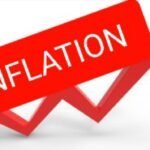The Inflation rate in Nigeria has risen for the twelfth consecutive time as the prices of goods and services continue to rise in the country.
According to the report released by the National Bureau of Statistics, the Consumer Price Index (CPI) which measures inflation increased by 13.22 percent year on year in August 2020, compared to 12.82 percent rate recorded in July.
On month-on-month basis, the headline index increased by 1.34 percent in August 2020, this is 0.09 percent rate higher than the 1.25 percent rate recorded in July 2020.
As was seen in July, increases were recorded in all 12 Classification of Individual Consumption by Purpose (COICOP) divisions that yielded the Headline index, such as food and non-alcoholic beverages; clothing and foot wear; housing, water, electricity, gas; health; transport, communication, etc.
August inflation rate is the highest that has been recorded in Nigeria in almost two and half years (29 months).
With the declining value of the nation’s currency, importers will spend more naira to acquire the same goods or raw materials, which will ultimately translate to a higher price for the consumers.
The recent exclusion of food items and fertilizer from official forex list, will be an added catalyst to the rising inflation in the country.
Have you read?
- CBN introduces low-interest Solar Connection Intervention Facility
- Nigeria produced 1.36 mb/d of Crude Oil in August – OPEC.
The composite food index rose by 16.00 percent in August 2020 compared to 15.48 percent in July 2020. This rise in the food index was caused by increases in prices of Bread and cereals, Potatoes, Yam and other tubers, Meat, Fish, Fruits, Oils and fats and Vegetables.
On month-on-month basis, the food sub-index increased by 1.67 percent in August 2020, up by 0.15 percent points from 1.52 percent recorded in July 2020.
The average annual rate of change of the Food sub-index for the twelve-month period ending August 2020 over the previous twelve-month average was 14.87 percent, representing a 0.24 percent points increase from the average annual rate of change recorded in July 2020 (14.63 percent) according to the report.
The ”All items less farm produce” (or Core inflation), which excludes the prices of volatile agricultural produce stood at 10.52 percent in August 2020, up by 0.42 percent when compared with 10.10 percent recorded in July 2020.
On month-on-month basis, the core sub-index increased by 1.05 percent in August 2020. This was up by 0.30 percent when compared with 0.75 percent recorded in July 2020.
The highest increases were recorded in prices of Passenger transport by air, Hospital services, Medical services, Pharmaceutical products, Maintenance and repair of personal transport equipment, Vehicle spare parts, Motor cars, Passenger transport by road, Miscellaneous services relating to the dwelling, Repair of furniture and Paramedical services.
In August 2020, all items index on year on year basis was highest in Kogi (17.29%), Bauchi (15.77%) and Ebonyi and Yobe (14.71%), while Lagos (11.45%), Kwara (11.22%) and Abuja (11.17%) recorded the slowest rise in headline Year on Year inflation.
On month on month basis however, all items inflation was highest in Ondo (2.20%), Ogun (2.07%) and Abia (1.87%), while Plateau (0.72%), Zamfara (0.60%) and Sokoto (0.54%) recorded the slowest rise in headline month on month inflation
Read further; How are Financial Statements Prepared? Establishment/Preparation of a Company
In August 2020, food inflation on a year on year basis was highest in Kogi (22.03%), Kwara (19.11%) and Edo (17.95%), while Gombe (14.33%), Kano (13.99%) and Bauchi (13.42%) recorded the slowest rise.
On month on month basis however, food inflation was highest in Ogun (3.27%), Lagos (3.13%) and Abia (2.81%), while Plateau (0.67%), Zamfara (0.24%) and Sokoto (0.13%), recorded the slowest rise.
With continuous rise in inflation rate, the purchasing power of the masses is declining.
This means that the same amount of money will purchase limited amount of goods or services than it use to. This scenario presents a difficulty especially for fixed income earners, whose income is not moving in the same direction as the inflation.
The reduction in value of money also have adverse effects on cash assets especially the cash held at hand or in bank accounts.
Written by;
Ifunanya Ikueze



















































